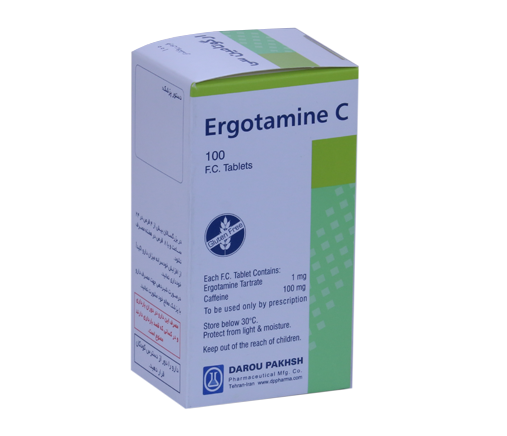Ergotamine (As Tartrate) / Caffeine
- Ergotamine (As Tartrate) / Caffeine
- No Brand Name
- Tablet
- -
- Blister
- 100 Tablets
Each Tablet Contains:
• Ergotamine 1mg
• Caffeine 100mg
• Ergotamine 1mg
• Caffeine 100mg
• Vascular Headache
Mechanism of Action
Ergotamine: Alpha-adrenergic blocking agent with direct stimulating effect on smooth muscle of peripheral and cranial blood vessels, also elicits serotonin antagonism
Caffeine: Cranial vasoconstrictor, added to further enhance vasoconstrictive effect without increasing ergotamine dosage
Pharmacokinetics
Bioavailability: <5%
Peak plasma time: 2 hr
Excretion: Feces (90%)
Contraindications
• Potent CYP3A4 inhibitors owing to risk of acute ergot toxicity
• Pregnancy
• Peripheral vascular disease, coronary heart disease, hypertension, impaired hepatic or renal function, sepsis
• Hypersensitivity to any of the ingredients
Adverse Reactions
Nausea and Vomiting, Paresthesia, Numbness, Weakness, Vertigo, Localized Edema, Itching, Ischemia, Cyanosis, Absence of Pulse, Cold Extremities, Gangrene, Precordial Distress and Pain, EKG Changes, Muscle Pains
Major Drug Interactions
Almotriptan - Clarithromycin - Cobicistat - Eletriptan - Elvitegravir/Cobicistat/Emtricitabine/Tenofovir Df - Fezolinetant - Frovatriptan - Glyceryl Trinitrate Pr - Isocarboxazid - Itraconazole - Ketoconazole - Letermovir - Levoketoconazole - Linezolid - Mifepristone - Naratriptan - Nirmatrelvir - Nirmatrelvir/Ritonavir - Nitroglycerin - Phenelzine - Procarbazine - Pseudoephedrine - Rizatriptan - Selegiline Transdermal - Sumatriptan - Tranylcypromine - Voriconazole
Warnings
• Serious and/or life-threatening peripheral ischemia associated with coadministration of ergotamine and caffeine with potent CYP3A4 inhibitors including protease inhibitors and macrolide antibiotics
• Because CYP3A4 inhibition elevates ergotamine and caffeine serum levels, the risk for vasospasm leading to cerebral ischemia and/or ischemia of the extremities is increased
• Concomitant use of these medications is contraindicated
Recommendations for Patient
• Do not use for chronic daily administration
Pregnancy Considerations
Contraindicated
Breastfeeding Considerations
Ergot drugs are known to inhibit prolactin, but there are no reports of decreased lactation with ergotamine/caffeine
Ergotamine is excreted in breast milk and may cause symptoms of vomiting, diarrhea, weak pulse, and unstable blood pressure in nursing infants
Owing to the potential serious adverse reactions in nursing infants, a decision should be made whether to discontinue nursing or discontinue the drug, considering the importance of the drug to the mother
Pregnancy Categories
A: Generally acceptable. Controlled studies in pregnant women show no evidence of fetal risk.
B: Maybe acceptable. Either animal studies show no risk but human studies not available or animal studies showed minor risks and human studies done and showed no risk.
C: Use with caution if benefits outweigh risks. Animal studies show risk and human studies not available or neither animal nor human studies done.
D: Use in LIFE-THREATENING emergencies when no safer drug available. Positive evidence of human fetal risk.
X: Do not use in pregnancy. Risks involved outweigh potential benefits. Safer alternatives exist.
NA: Information not available.

Ergotamine: Alpha-adrenergic blocking agent with direct stimulating effect on smooth muscle of peripheral and cranial blood vessels, also elicits serotonin antagonism
Caffeine: Cranial vasoconstrictor, added to further enhance vasoconstrictive effect without increasing ergotamine dosage
Pharmacokinetics
Bioavailability: <5%
Peak plasma time: 2 hr
Excretion: Feces (90%)
Contraindications
• Potent CYP3A4 inhibitors owing to risk of acute ergot toxicity
• Pregnancy
• Peripheral vascular disease, coronary heart disease, hypertension, impaired hepatic or renal function, sepsis
• Hypersensitivity to any of the ingredients
Adverse Reactions
Nausea and Vomiting, Paresthesia, Numbness, Weakness, Vertigo, Localized Edema, Itching, Ischemia, Cyanosis, Absence of Pulse, Cold Extremities, Gangrene, Precordial Distress and Pain, EKG Changes, Muscle Pains
Major Drug Interactions
Almotriptan - Clarithromycin - Cobicistat - Eletriptan - Elvitegravir/Cobicistat/Emtricitabine/Tenofovir Df - Fezolinetant - Frovatriptan - Glyceryl Trinitrate Pr - Isocarboxazid - Itraconazole - Ketoconazole - Letermovir - Levoketoconazole - Linezolid - Mifepristone - Naratriptan - Nirmatrelvir - Nirmatrelvir/Ritonavir - Nitroglycerin - Phenelzine - Procarbazine - Pseudoephedrine - Rizatriptan - Selegiline Transdermal - Sumatriptan - Tranylcypromine - Voriconazole
Warnings
• Serious and/or life-threatening peripheral ischemia associated with coadministration of ergotamine and caffeine with potent CYP3A4 inhibitors including protease inhibitors and macrolide antibiotics
• Because CYP3A4 inhibition elevates ergotamine and caffeine serum levels, the risk for vasospasm leading to cerebral ischemia and/or ischemia of the extremities is increased
• Concomitant use of these medications is contraindicated
Recommendations for Patient
• Do not use for chronic daily administration
Pregnancy Considerations
Contraindicated
Breastfeeding Considerations
Ergot drugs are known to inhibit prolactin, but there are no reports of decreased lactation with ergotamine/caffeine
Ergotamine is excreted in breast milk and may cause symptoms of vomiting, diarrhea, weak pulse, and unstable blood pressure in nursing infants
Owing to the potential serious adverse reactions in nursing infants, a decision should be made whether to discontinue nursing or discontinue the drug, considering the importance of the drug to the mother
Pregnancy Categories
A: Generally acceptable. Controlled studies in pregnant women show no evidence of fetal risk.
B: Maybe acceptable. Either animal studies show no risk but human studies not available or animal studies showed minor risks and human studies done and showed no risk.
C: Use with caution if benefits outweigh risks. Animal studies show risk and human studies not available or neither animal nor human studies done.
D: Use in LIFE-THREATENING emergencies when no safer drug available. Positive evidence of human fetal risk.
X: Do not use in pregnancy. Risks involved outweigh potential benefits. Safer alternatives exist.
NA: Information not available.
Send to other people



